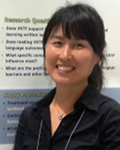Ph.D. in Education, 2016
School of Education
September 1, 2013
Doctoral Research Centers on Ways to Utilize Technology for Teaching and Learning Languages
Youngmin Park is a Ph.D. student in Education with a specialization in Language, Literacy, and Technology (LLT). Her ultimate goals are to support underserved language learners and to assist teachers with developing pedagogical support, and she believes that technology can be a vital means to this end. Her research interests include digital literacy, utilization of technology in language learning, and narrowing the socioeconomic gap in education and access to technology.
Fresh out of college in Korea fifteen years ago, Youngmin passed a competitive teaching certification exam and became a typical novice teacher armed only with some basic theories but full of enthusiasm.
I hoped that I could motivate disadvantaged or demotivated students in my classes through my teaching; however, I ended up teaching test taking tricks to help students prepare for highly competitive examinations. This is why I grew weary of teaching, halfway through my career.
Rather than just dwelling on the routines of teaching to the test, Youngmin decided to actively participate in several workshops and conferences, which quenched her thirst for new pedagogical approaches. The ideas that she learned included instructional strategies and technology, and she applied these in her teaching.
I incorporated extensive reading into my teaching, while intensive reading was the dominant mode of teaching English in Korea. My students had chances to enjoy whole stories of diverse texts, in addition to learning bottom-up reading strategies.
Youngmin also developed a number of movie clips for vocabulary learning, which contained a series of pictures immediately followed by the appropriate English word for each picture. Watching these video clips, even low-performing students easily memorized all of the target words without the Korean translation.
Despite these examples of successful teaching practices, Youngmin felt something was missing, and she wanted to know more about theoretical backgrounds of her practical approaches. That desire led her to enroll in graduate school.
In my master’s program, I learned about research design and statistics, and was then able to conduct classroom experiments to explore whether and how the new teaching methods worked for students’ literacy development.
Given opportunities to share the results of her experiments with educators, she presented her extensive reading study at the Korean TESOL conference, and published her pattern poetry study in an academic journal.
Youngmin’s experiences broadened not only her expertise, but also her professional network. She was invited to talk about her teaching experiences and strategies for in-service teacher training programs.
This was a great moment for me because sharing my knowledge with other teachers was one of my goals.
Youngmin was also invited to take part in several national committees to discuss college entrance examination, standardized examination of academic performance, and textbook authorization. Discussions during the committee sessions broadened her exposure to the current educational situation in Korea and inspired her to explore fundamental problems and possible answers.
When participating in a TESL/TEFL program at San Diego State University in the summer of 2008, Youngmin decided to pursue doctoral study in the U.S. However, studying abroad presented several challenges. The first challenge was financial, since graduate study is normally very expensive for international students. Youngmin’s financial needs were met when she received a Korean Government Scholarship as a result of her hard work and diverse experiences.
The second challenge was determining how family obligations would be met during the time she would be pursuing an advanced degree.
I recognized that raising two children alone would be demanding but at the same time this would present an opportunity to closely observe language development and experience various educational systems in different countries.
The third challenge – locating a graduate program that met her academic expectations – was also hard, but Youngmin believes she was fortunate to find a school and an advisor that fit her interests.
The Language, Literacy, and Technology specialization at UCI is allowing me to explore ways to facilitate language teaching and learning by using technology. In recently published book chapters, I shared ideas that exemplify how technology enhances traditional literacy instruction. Working with my advisor, Professor Mark Warschauer, I have engaged in a research project that examines the effectiveness of software, called visual-syntactic text formatting (VSTF), in enhancing adolescent literacy competencies without compromising content learning.
Youngmin has presented her studies in several conferences, including the International Society for Technology in Education, UC Language Consortium, Society for the Scientific Studies of Reading, and Korean Association of Teachers of English. In future research, she would like to investigate more ways in which such software can narrow the English language divide that is frequently associated with the social divide, which can contribute to better educational atmosphere in both America and Korea.
Youngmin is currently spending summer with her family in Vienna, Austria, where her husband studies. Now that her children are going to be educated there, she is looking forward to continue learning about language development through her children as well as deepening her understanding about European education.
